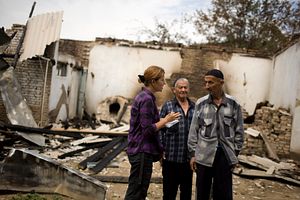I am heading to Kyrgyzstan to meet one of the most courageous, honorable, and committed human rights activists in Central Asia. When I first met Azimjan Askarov, he was courageously helping refugees fleeing the 2005 Andijan massacre. Unfortunately, the next time I see him will be in a prison visiting room. Azimjan, aged 65, has been in jail since 2010 because he dared to expose human rights violations by police and prison authorities in southern Kyrgyzstan. He may spend the rest of his life there.
But there is hope. Thanks to UN and international pressure, Kyrgyzstan’s Supreme Court is set to review Azimjan’s case this Monday.
Azimjan’s case is revealing of the arbitrary, heavy-handed way Central Asian governments have for years responded to expressions of dissent, protests and security threats, be they real or perceived. The review is an opportunity for the Supreme Court to free the human rights activist who should never have been jailed in the first place.
The ruling will have a significant impact on the international reputation of a country that claims to be a bastion of democracy in Central Asia. Those progressive credentials will remain under the spotlight when German Chancellor Angela Merkel visits next week, and again in two months when the country celebrates its 25th anniversary of independence.
I first met Azimjan in southern Kyrgyzstan in 2005, where he was helping refugees who had fled a horrendous massacre in neighboring Uzbekistan and engaging with the local Kyrgyz community to alleviate tensions with the newly arrived refugees.
Then in June 2010, when clashes erupted between ethnic Kyrgyz and Uzbek communities in southern Kyrgyzstan, Azimjan documented the violence, killings and arson attacks directed mostly at Uzbek homes and buildings in his hometown of Bazar-Korgon. I was there at the time as well, witnessing both the violence and the heavy-handed response of the security forces who arrested hundreds of people–the vast majority of them ethnic Uzbeks–often arbitrarily, and tortured them to extract “confessions.”
Azimjan was among the victims of this brutal government crackdown. We had to immediately intervene as the local authorities didn’t want to allow a lawyer to visit him, and when I eventually came to the cell with the lawyer, three policemen were standing around us, refusing to leave.
I will never forget that visit. Azimjan, usually positive and composed, looked shaken. There were tears in his eyes. He was in pain (his lawyer later took a photograph which showed large bruises on his back and sides), and scared, but most painful was the sense of injustice. I talked to the policemen outside of the station: they were angry and agitated, as one of their colleagues had been killed in the clashes. And they didn’t hide their intentions to take it out on Azimjan. One said: “You may believe he is clean and innocent, but we know that he is a piece of shit.” The second added that he should be promptly executed.
I was worried for Azimjan’s safety, but we all thought it would be over soon. The charges—accusations of hostage-taking, “inciting ethnic hatred,” or complicity in murder — were not only baseless, they sounded like absolute nonsense.
Instead, just three months later, a local court sentenced him to life imprisonment and confiscated his property. The court disregarded evidence presented by the defense team, and refused to investigate allegations of torture – even though Azimjan and his co-defendants had visible bruises on their faces during the hearing. Before and during the hearings, the police did nothing to protect Azimjan’s lawyer and his family from the attacks of angry crowds outside the court.
Azimjan told Amnesty International in 2010 how the authorities also targeted his family:
“They’ve ransacked our lovely home and destroyed our garden, they took away the bags of rice we had bought in preparation for my youngest son’s wedding, they took all the jars of homemade fruit jam, pickled foods, the cakes we had baked, everything…They burned down my office. They beat my brother so badly that he is now disabled, my wife is ill, my sons mostly in hiding. They have destroyed us.”
Azimjan has spent six terrible years in solitary confinement, in a prison cell intended for short-term detention, denied medical treatment despite his rapidly deteriorating health. Amnesty International declared Azimjan Askarov a prisoner of conscience in 2010 and has campaigned for his release ever since. Thousands of our members have sent letters to authorities asking for his release. They also expressed their solidarity and support by sending him children’s drawings, art materials, postcards and art books. Azimjan is particularly fond of the children’s drawings that he keeps on the walls of his cell. He says the drawings he receives give him spiritual strength, as do the art books that he says transport him to the halls of the world’s great museums.”
In 2012, German Chancellor Angela Merkel, who will visit Kyrgyzstan next week, publicly called for Azimjan’s release during a visit from Kyrgyzstani President Almazbek Atambaev.
On April 21, 2016, the UN Human Rights Committee called on Kyrgyzstan to immediately release Azimjan Askarov and quash his conviction, after finding that he had been arbitrarily detained, held in inhumane conditions, tortured and mistreated, and prevented from adequately preparing his trial defense.
It is because of this decision that the Supreme Court will review his case this Monday, in a public hearing, attended by numerous international organisations and diplomats. That at least is progress. But we also have received worrying indications that angry crowds will gather outside to intimidate the court. The question now is what the Supreme Court will do now.
Governments, diplomats, and Amnesty International supporters around the world will be watching.
Anna Neistat is Senior Director for Research at Amnesty International. Follow her on Twitter @AnnaNeistat.

































